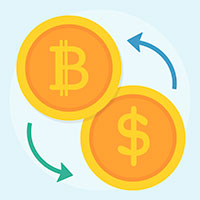Just like any other financial market, the Forex market has been a target of Forex scammers for a very long time. Unethical behaviour, promises of unusually large profits without any risk, and the advertisement of “holy grails” are all signs of a Forex scammer who wants to make a profit from naïve traders. Fortunately, there are easy ways you can identify a Forex scammer and protect yourself from their misleading promises. In this article, we’ll cover exactly that, and show you how Forex scammers operate.
How to identify a Forex scammer
Forex scammers may come in different forms, but they all share one thing in common: they’re non-transparent, unregulated, and promise trading results which sound too good to be true. Beginners may have a hard time identifying these characteristics due to their inexperience, which is the main reason why beginners are often targeted by Forex scammers. As you gain trading experience along the way, it will become significantly easier for you to spot these unethical practices and protect yourself from Forex frauds.
If a trader promises hundreds of pips per day without any risk, or tries to sell a trading robot which makes thousands of pips with the click of a mouse, you should be very cautious about that offer. If a trader really had an extremely profitable trading strategy or trading robot, they wouldn't have to sell that system to other traders, right? They could simply make hundreds of pips with their system and wouldn’t waste their time advertising their product to other traders.
Regulation, or rather lack of it, is also a very important sign of a Forex fraud. Check whether the company which promises unusually high profits is regulated by scrolling through its website. Regulated companies always showcase their licence or regulatory authority on their website, and if you’re unable to find this information, you’re probably dealing with a fraud.
Here we've prepared a short checklist of the main points you need to look for to identify potential scammers:
- Does the trader or company promise extremely high profits and doesn’t mention any risks associated with the strategy? If so, it’s probably a fraud.
- Can you find information about the company’s regulation on its website? If not, be cautious when dealing with the company.
- Can you find any additional background information about the trader or the company?
- Does the trader have their trading results verified by a third party?
These signs, and more, will be discussed in more detail in the following lines.
Additional signs of Forex scams
There are many more ways of identifying Forex trading scams, such as trading results which are not verified, emails that ask for personal information, or the unavailability of background information.
Unverified trading results – This scam is very popular with Forex signal providers. A trader will claim that they are constantly profitable on the market, and post screenshots of their trading performance on social media. The trading results often show extreme profit, sometimes even without a single losing trade. Beginners without trading experience are especially attracted to these types of scams as they don’t know how much profit to expect when trading. Needless to say, you should be very cautious when someone makes their trading results publicly available. Ask the trader if the results are verified by a third-party provider, such as myfxbook. If the trader refuses to provide you with a link to their verified results, simply forget about that trader and choose another, as it is highly likely that they are a fraud.
Unprofessional emails – Unprofessional emails are another obvious sign of an online Forex trading scam. Email marketing is very common these days, but if the tone of the email sounds unprofessional or if the person asks for any personal information, it’s probably a scam. Forex scammers often use email lists bought on the dark web to send hundreds, or even thousands of emails to traders, offering various trading products. Again, make sure there is background information about the person sending the emails – or if it’s a company, check that it is regulated by browsing its website. If you are unable to find any of the above, and the emails ask for personal information to send you a “free e-book” or something similar, it’s probably a scam.
No background information – We’ve already mentioned the importance of checking for background information about a trader or company that promises extremely high profits or asks for your personal information. Scammers often change their identity and act under an imaginary name, so that their victims can’t track them on the Internet. It’s also common for scammers to use pictures of traders found on the internet, claiming that the person in the picture is them.
A simple Google search can help you out a lot. Search for the name of the trader or the company and see whether you can find any background information that proves the scammer’s claims. If you’re dealing with a serious company or trader, you may also be able to find reviews from other customers who have used their services. Always do your research to avoid falling for this type of scam.
Protect yourself against Forex scams
Now that we have covered the most important signs that identify a Forex scammer, it’s time to take a look at ways you can protect yourself. Being cautious about any offer is usually the best solution, but there are also some additional ways.
If it’s too good to be true, it’s probably a scam
Common sense helps a lot in these situations. If someone claims to make hundreds of pips per day without a single losing trade with their strategy, it’s probably too good to be true. Even professional traders have losing trades from time to time. If the results are not verified by an independent third-party service, you’re most likely dealing with a scam.
Educate yourself
Nothing is more powerful than knowledge. Scammers usually target beginners who don’t have enough trading experience to identify what returns are realistic on the market. Education doesn’t come overnight, but with time you’ll find it way easier to spot Forex frauds even from a distance. Invest in your trading education and gain experience, and you won’t become an easy target for Forex scams.
Don’t send your personal data
Never give out your personal information! Scammers may use it to steal your identity and to attract new victims under your name. Always ask yourself – why do they need my personal information? If there is no obvious answer to this question, don’t send any personal data and stop wasting your time with the company. It’s very important to know how to protect your personal information. Regulated companies have to store all of their clients' personal information, such as ID cards and passport copies, in a safe place and can only use the data for their internal procedures.
Contact the regulatory body
Finally, if you’re unsure whether a company is regulated or not, your best bet would be to directly contact the regulatory body of the company’s jurisdiction. You’ll first need to find out the location of the company in order to reach out to the regulatory body of that country. Many regulatory authorities feature a database of regulated companies on their website, where you search and find additional information about the company’s license. Popular regulatory bodies in the Forex industry include the FCA in the United Kingdom, CySEC for Cyprus-based companies which offer their services in the European Union, and the CFTC and NFA in the United States.
Conclusion
There are scammers and unethical persons operating across all markets, and the Forex market is no exception. There are many signs of Forex trading investment scams that can be used to identify and uncover a scammer, such as promises of extremely high profits without verification, the absence of any industry regulation, unprofessional emails which ask for personal data, or the unavailability of background information. Always perform detailed research on these points before you buy a trading product. In addition, make sure to educate yourself about trading, since scammers usually target beginners who aren't experienced enough to identify unrealistic trading results. If an email asks for personal info, never provide the information right away, but first check why the person or company needs your personal data. You should send copies of your ID cards or passports only if you’re sure that the company is legit. Performing a check on the regulatory body’s website to see whether the company is listed in the database is also a wise decision. To perform the check, first find out where the company is located and go to the website of the regulatory body which governs that jurisdiction. If the company is not listed in the database of regulated companies, it’s probably a scam.
 For active traders and investors, mastering the art of trading volatility is a crucial skill. Volatility, in financial terms, refers to the extent to which asset prices fluctuate over time. High volatility markets experience rapid price swings...
For active traders and investors, mastering the art of trading volatility is a crucial skill. Volatility, in financial terms, refers to the extent to which asset prices fluctuate over time. High volatility markets experience rapid price swings... The global financial market operates as a dynamic ecosystem, where understanding the connections between different market movements can provide invaluable insights for forecasting...
The global financial market operates as a dynamic ecosystem, where understanding the connections between different market movements can provide invaluable insights for forecasting... The forex market, also known as the foreign exchange market, stands as the largest and most traded financial market globally. FXTM is committed to equipping our clients...
The forex market, also known as the foreign exchange market, stands as the largest and most traded financial market globally. FXTM is committed to equipping our clients... Cryptocurrency trading has rapidly grown into a bustling and dynamic market that attracts traders from around the world. With the potential for significant profits...
Cryptocurrency trading has rapidly grown into a bustling and dynamic market that attracts traders from around the world. With the potential for significant profits... The year 2023 has been a landmark period for the international broker Octa (formerly known as OctaFX), characterized by significant achievements and substantial contributions...
The year 2023 has been a landmark period for the international broker Octa (formerly known as OctaFX), characterized by significant achievements and substantial contributions...